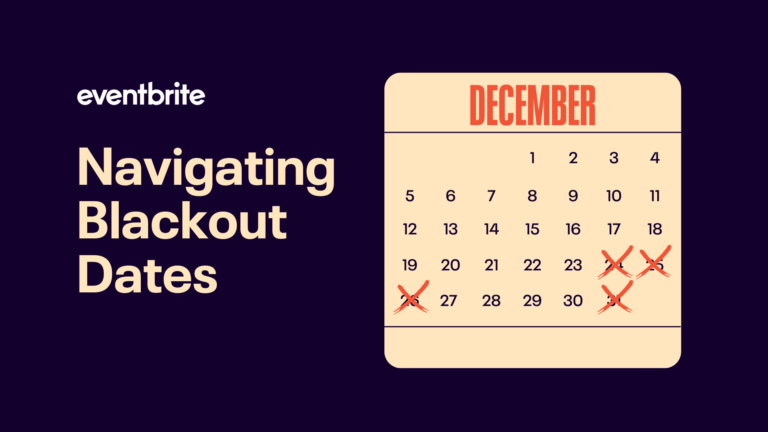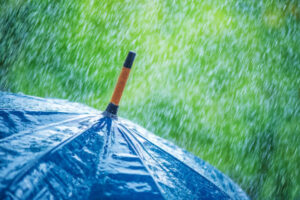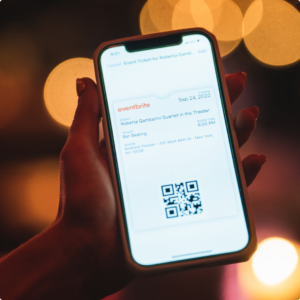Planning an event is already a huge undertaking, and it can become even more complicated when blackout dates come into play.
Blackout dates are days of the year that event creators avoid due to high demand, closures, or holiday-related rules. If your event falls on one of these days, you’ll need to make sure you’re well prepared.
Blackout dates are something event planners usually plan around, but all event creators need to be aware of.
Thankfully, we’re here to help. Eventbrite helps event creators with all the tools and know-how they need to make sure everything runs smoothly. With event experts on hand, we’re ready to give you the advice you need.
From understanding why blackout dates exist in the first place to learning tips for preparing your event if you need to hold it on a blackout date, in this article, we’ll tell you everything you need to know about navigating those tricky restrictions.
What are blackout dates?
Blackout dates are times when you can’t use travel rewards or other special discounts. They usually apply to hotels, airlines, and other businesses in the travel and hospitality industry. They’re days that have such high demand, those businesses can exclude them from the usual promotions. In the theme-park industry, they are sometimes also known as blockout dates.
Blackout dates typically coincide with high-demand periods such as major holidays, weekends, or special events that increase demand. They vary depending on the location, industry, or even the individual business. However, you can still get a general idea of when US blackout dates might be from the list of dates below.
For example, the period at the end of December usually includes many blackout dates for companies in the US travel industry. That’s because an average of 102 million people traveled each year during that season from 2011 to 2021, making promotions like airline miles not necessary for travel companies to drum up business.
Take a look at this list of the most common blackout dates.
These are the days when it’s most difficult for attendees to access their travel rewards and points, make hotel reservations, and avoid conflicts with other events.
Tip from event professionals: Because blackout dates vary so widely from place to place, looking at a calendar of local holidays and celebrations is a good idea. A local music festival, a day of town pride, or other events could cause blackout dates. You can be more certain of New Year celebrations, but finding out about more local holidays could take some research.

How do blackout dates affect event scheduling?
Blackout dates can dramatically affect your event planning. Since they coincide with periods of high demand, it can be challenging to find venues, staff, or vendors that aren’t already booked.
Even if you do manage to secure a location and all the necessary resources, prices often skyrocket on blackout dates due to the added demand.
Blackout dates can also create problems for your attendees. Many people may already have vacation plans for days like holidays, making attending your event difficult. Because these dates are excluded from travel rewards programs, people might also be less willing to travel, since it will mean a much higher cost.
Finally, you also might run into trouble with blackout dates because of the number of other events happening simultaneously.
Competition for attendees can be fierce, so you’ll need to make sure your event stands out. Try and have a unique draw, like an industry figure or activity that others aren’t offering. The same goes for sponsors and vendors who may not be able to partner with you because of their own existing commitments.
Tip from event professionals: A package that includes travel and accommodation can alleviate some of the issues around events on blackout dates. By working out a deal with travel and accommodation providers, you can assure your attendees that they’ll have a place to stay and a way to get there.

How can you plan around blackout dates?
Good event planning for blackout dates starts far ahead of time. Check to see if it is likely your event will fall on a blackout date, and call ahead to your venues and vendors to see if it will.
If your event does seem like it’ll land on a blackout day, you should call far enough in advance that you can move it to a different day. Even shifting it by 24 hours can significantly affect travel costs and vendor availability.
However, pay attention: there may be better options than this if your attendees will still need to travel the day before or after — on a blackout date.
It pays to speak to venues, vendors, and travel providers as early as possible in order to avoid the worst of the blackout dates. You may be able to negotiate better deals and more flexibility if you give them enough time to plan.
Tip from event professionals: If you do need to plan your event on a blackout date, book your venue and vendors far ahead of time and guarantee them a fair deal. Make backup plans for other venues and vendors you could call if your plan A venue cancels on you, and stay in touch with your primary vendors even if you book them far ahead of time.
You can also rely on Eventbrite’s preferred vendors if you want the reassurance that comes with trusted, experienced vendors who will treat you fairly.
You’re far less likely to run into issues if you have continuous communication and a friendly relationship.
What if your event lands on a blackout date?
The primary advice up to this point has been, “don’t plan your events for blackout dates” and “plan far ahead of time to avoid issues.”
But life isn’t always that simple. Sometimes you need to hold an event on a blackout date, and you can’t change the planning you did in the past.
If you find yourself in that situation, try to plan for venues that are less likely to fill up and are close to inexpensive accommodation. That way, your guests won’t worry as much about hotel costs. That may require going to locations a little out of the way, especially as venues fill up on the busiest days of the year.
When it’s possible, many organizers prefer to host events that land on blackout dates at venues they own themselves. For example, the African Community Center of the DC Metro hosted their Refugees’ First Thanksgiving meal at their own offices.
If transportation and accommodations will be inaccessible for many people, consider making virtual attendance easy and fulfilling. Ensure your virtual event has plenty of activities people can do remotely and a structure that allows your attendees to meet and speak in breakout rooms.
Tip from event professionals: A blackout date in one location might be a normal day nearby. A parade or local festival could make one town overcrowded on a particular weekend, but their neighbors in the next town over could have plenty of space for attendees. On a larger scale, Canada doesn’t celebrate all US-based holidays like the Fourth of July, so it may be possible to move your event over the border if necessary.

Don’t let blackout dates spoil your event
To ensure blackout dates don’t spoil your event, you need a platform that allows you to plan your event far in advance, get invitations out quickly and efficiently, and track feedback from your attendees.
Those are the features that set Eventbrite apart as the platform of choice for professional event organizers. With enterprise-grade event marketing tools at your fingertips, you can get word out and let your attendees know about your event far before blackout dates can create issues for you.





